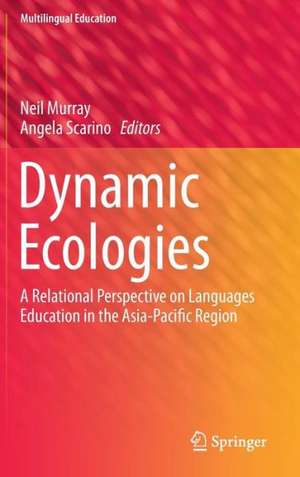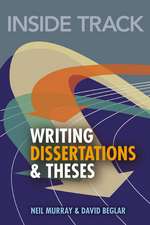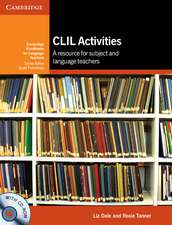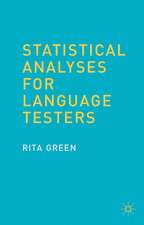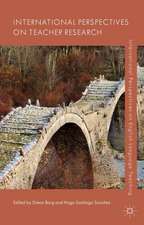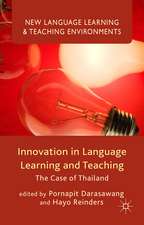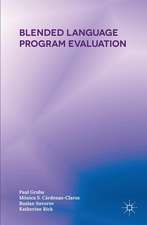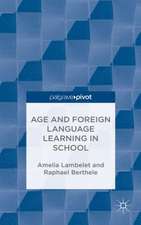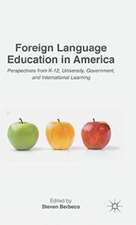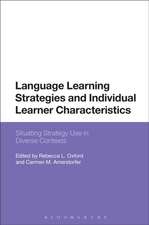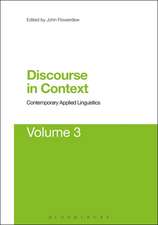Dynamic Ecologies: A Relational Perspective on Languages Education in the Asia-Pacific Region: Multilingual Education, cartea 9
Editat de Neil Murray, Angela Scarinoen Limba Engleză Hardback – 27 ian 2014
| Toate formatele și edițiile | Preț | Express |
|---|---|---|
| Paperback (1) | 556.65 lei 38-44 zile | |
| SPRINGER NETHERLANDS – 17 sep 2016 | 556.65 lei 38-44 zile | |
| Hardback (1) | 567.32 lei 38-44 zile | |
| SPRINGER NETHERLANDS – 27 ian 2014 | 567.32 lei 38-44 zile |
Din seria Multilingual Education
- 18%
 Preț: 902.36 lei
Preț: 902.36 lei - 18%
 Preț: 956.81 lei
Preț: 956.81 lei - 18%
 Preț: 953.65 lei
Preț: 953.65 lei - 18%
 Preț: 836.29 lei
Preț: 836.29 lei - 15%
 Preț: 638.24 lei
Preț: 638.24 lei - 20%
 Preț: 567.32 lei
Preț: 567.32 lei - 20%
 Preț: 566.76 lei
Preț: 566.76 lei - 20%
 Preț: 569.86 lei
Preț: 569.86 lei - 15%
 Preț: 649.87 lei
Preț: 649.87 lei - 15%
 Preț: 645.28 lei
Preț: 645.28 lei -
 Preț: 394.87 lei
Preț: 394.87 lei - 15%
 Preț: 643.84 lei
Preț: 643.84 lei - 15%
 Preț: 643.34 lei
Preț: 643.34 lei -
 Preț: 389.49 lei
Preț: 389.49 lei - 15%
 Preț: 704.36 lei
Preț: 704.36 lei - 20%
 Preț: 555.53 lei
Preț: 555.53 lei - 18%
 Preț: 953.65 lei
Preț: 953.65 lei - 18%
 Preț: 952.26 lei
Preț: 952.26 lei - 15%
 Preț: 646.43 lei
Preț: 646.43 lei - 15%
 Preț: 585.40 lei
Preț: 585.40 lei - 18%
 Preț: 787.15 lei
Preț: 787.15 lei - 18%
 Preț: 1009.22 lei
Preț: 1009.22 lei - 18%
 Preț: 948.92 lei
Preț: 948.92 lei - 15%
 Preț: 649.22 lei
Preț: 649.22 lei - 18%
 Preț: 1113.39 lei
Preț: 1113.39 lei - 15%
 Preț: 644.95 lei
Preț: 644.95 lei - 15%
 Preț: 634.68 lei
Preț: 634.68 lei - 15%
 Preț: 644.63 lei
Preț: 644.63 lei -
 Preț: 388.90 lei
Preț: 388.90 lei - 15%
 Preț: 647.27 lei
Preț: 647.27 lei - 15%
 Preț: 641.85 lei
Preț: 641.85 lei - 15%
 Preț: 635.80 lei
Preț: 635.80 lei
Preț: 567.32 lei
Preț vechi: 709.15 lei
-20% Nou
Puncte Express: 851
Preț estimativ în valută:
108.57€ • 112.93$ • 89.63£
108.57€ • 112.93$ • 89.63£
Carte tipărită la comandă
Livrare economică 11-17 aprilie
Preluare comenzi: 021 569.72.76
Specificații
ISBN-13: 9789400779716
ISBN-10: 9400779712
Pagini: 180
Ilustrații: XI, 233 p. 14 illus.
Dimensiuni: 155 x 235 x 20 mm
Greutate: 0.53 kg
Ediția:2014
Editura: SPRINGER NETHERLANDS
Colecția Springer
Seria Multilingual Education
Locul publicării:Dordrecht, Netherlands
ISBN-10: 9400779712
Pagini: 180
Ilustrații: XI, 233 p. 14 illus.
Dimensiuni: 155 x 235 x 20 mm
Greutate: 0.53 kg
Ediția:2014
Editura: SPRINGER NETHERLANDS
Colecția Springer
Seria Multilingual Education
Locul publicării:Dordrecht, Netherlands
Public țintă
ResearchCuprins
Part I The Changing Dynamics Between English Language and Mother Tongues in Asian Contexts.- 1. Introduction: A Relational View of Language Learning.- 2. English as a Medium of Instruction in East and Southeast Asian Universities.- 3. Plurilithic and Ecological Perspectives on English: Some Conceptual and Practical Implications.- 4. Global English in Singapore? A Re-exploration of the Localization of English.- 5. Asia and Anglosphere: Public Symbolism and Language Policy in Australia.- 6. English as Lingua Franca on Campus: Cultural Integration or Segregation?.- 7. Socioeconomic Disparities and Early English Education: A Case in Changzhou, China.- 8. English in Malaysia: An Inheritance from the Past and the Challenge for the Future.- Part II Asian Languages in Australia: The Challenges of Teaching, Learning and Assessment.- 9. Recognising the Diversity of Learner Achievements in Learning Asian Languages in School Education Settings.- 10. Dealing with ‘Chinese fever’: The Challenge of Chinese Teaching in the Australian Classroom.- 11. The Teaching and Learning of Indonesian in Australia: Issues and Prospects.- 12. On Rocky Ground: Monolingual Educational Structures and Japanese Language Education in Australia.- 13. Making Chinese Learnable for Beginning Second Language Learners?.- Part III Tensions in the Linguistic Space.- 14. Tensions in the Linguistic Space.- Index.
Textul de pe ultima copertă
This volume provides a fascinating glimpse into the complex language ecologies of Southeast Asia. Adopting a relational perspective, it considers their significance for the region, its peoples, the policy and practice of language teaching, learning and assessment and the fate of local languages. It gives particular prominence to the relationship between English and Chinese, its likely transformation at a time of significant global change and the impact that these two languages and their synergy will have on the place of other languages and dialects. Dynamic Ecologies: A Relational Perspective on Languages Education in the Asia-Pacific Region draws on the research and insights of key scholars in the field and provides case studies that illustrate the impact of relevant language policy in countries including Singapore, Malaysia, Hong Kong, South Korea and Australia.
Caracteristici
Focuses on the interaction between locally available languages in terms of policy and practice in language use and language learning Presents a relational view of language planning and language learning Provides a regional focus on a particularly dynamic geographical area, while identifying general principles that have relevance beyond the Asia-Pacific area Includes supplementary material: sn.pub/extras
